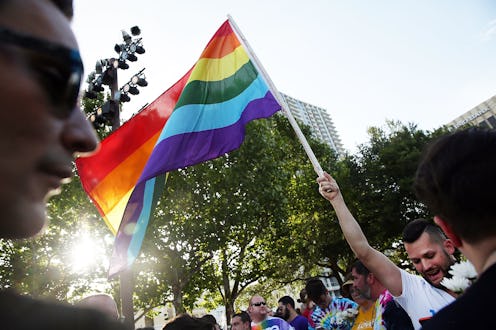
For LGBTQ youth, navigating questions about health, sexuality, and general wellness can be tough. It's no surprise, then, that a recent study from Planned Parenthood and the Human Rights Campaign and published in the Journal of Adolescent Health found that in the search for information about their health, LGBTQ youth use the internet to answer their questions with a high degree of frequency. While on the one hand, it's heartening to know that kids and teens are resourceful when it comes to finding out what they want to know about their own bodies, the news is also troubling. In short: It's a sign of how very badly sex education is failing younger generations in the United States.
Of course, many of us use the internet as a means of learning more about our health, bodies, and sexuality; the impulse to consult Dr. Search Engine is by no means limited to teens. But there's an important distinction between adults spending a few too many hours checking our symptoms on WebMD and kids who should be getting this information from reliable sources: Many schools leave LGBTQ issues out of health classes and sexual education, leaving queer youth without information necessary for their autonomy and well-being. Having your entire identity left out of a discussion on sexual consent or the necessity of getting tested for STIs is a problem — and when you consider the rise of "abstinence-only education," it's an even bigger problem when those discussions aren't even being had at all.
To conduct this study, researchers met with 92 LGBTQ teens for focus groups and interviews. These teens ranged in age between 15 and 19 and came from across the United States. Across the board, they shared a concerning sentiment: What they're learning in school about health and sex doesn't necessarily apply to them, so queer youth are left to find answers on their own.
These teens were not willing to believe everything they read on the internet, though; in fact, study participants felt they couldn’t trust that the information they got online was medically accurate. It's probably good that the teens displayed a healthy amount of skepticism; there's a lot of false information on the internet, after all. The trouble with sources that seemed more legitimate, though, is that the teens reported that the language was often too technical for them to comprehend and apply to themselves. Understandably, many teens also struggled with breaking down information and seeing how it may relate to their own experiences or questions.
The fact that these kids aren't getting the information they need is a big enough problem on its own. To compound things, though, is the big picture issue: When topics are left out of a discussion, it can give a sense that they are "inappropriate" or "wrong," and suggest that teachers, educators, and counselors are either uninformed or unwilling to give information. In the case of LGBTQ youth, what the erasure of their identities from the information presented communicates is that they themselves are "inappropriate" or "wrong," which is both obviously not the case and obviously a horrible thing to communicate.
So how do we fix the problem? There are a few solutions: Researchers suggest that we need an expansion of safe, reliable, and accurate LGBTQ-focused resources for health and sexuality information available online that speak to the diversity of the entire queer umbrella. Researchers also suggest building a sense of community to encourage queer youth to return to these resources and spread them among their peers.
And, of course, another important solution is to advocate for LGBTQ topics to be integrated into schools, both in the general curriculum as well as health and sexual education. All teens deserve access to accurate sex education, and making sex ed queer inclusive not only teaches LGBTQ youth, but also normalizes queer people and queer sex for heterosexual and cisgender students in the room.
Representation matters. It matters everywhere, and in all things, including education. So let's get to work.